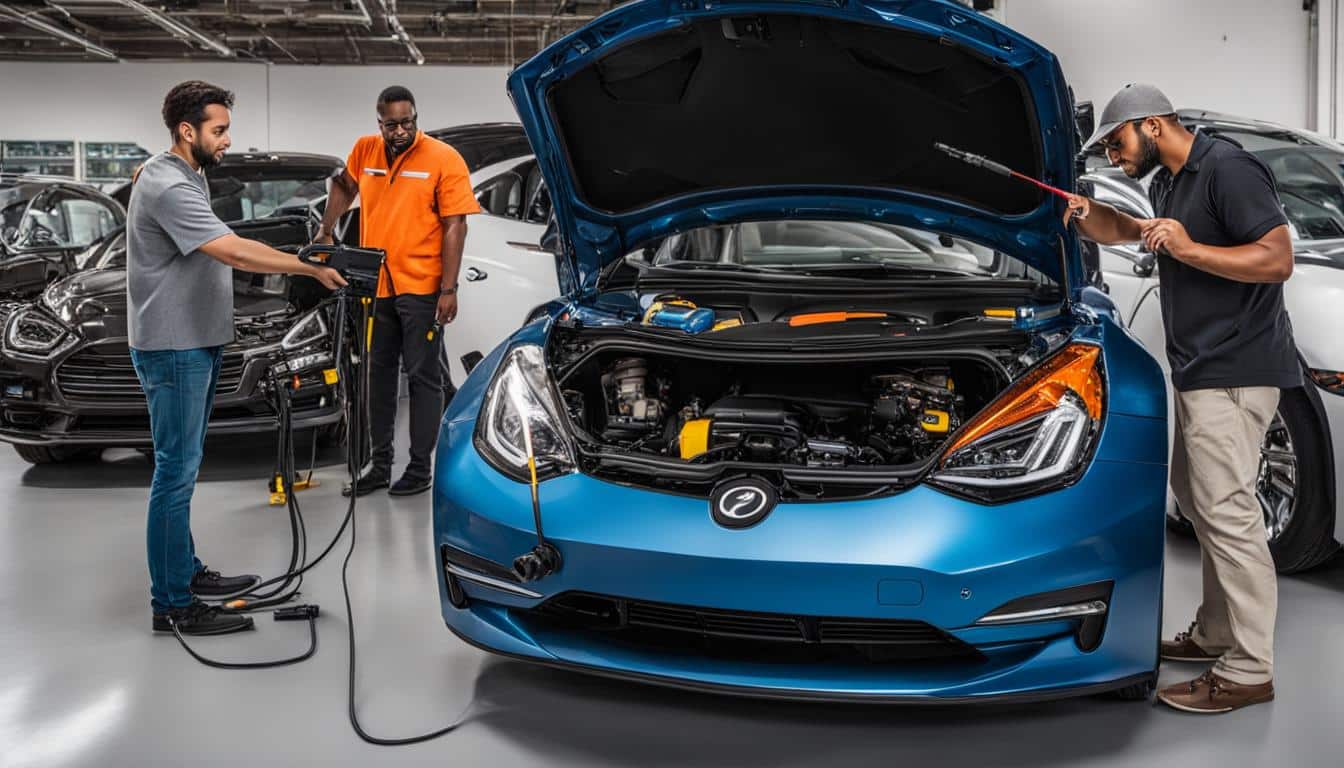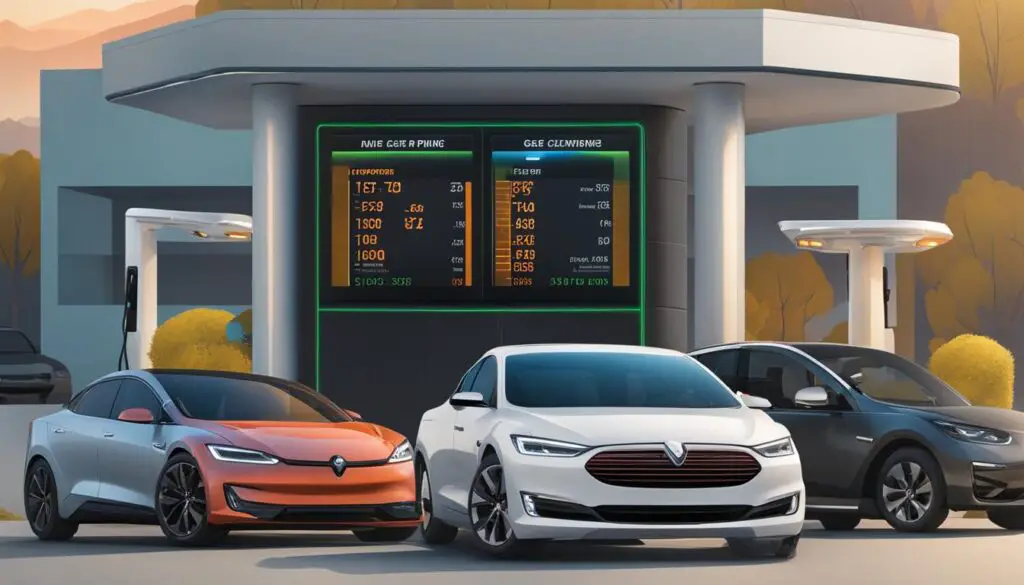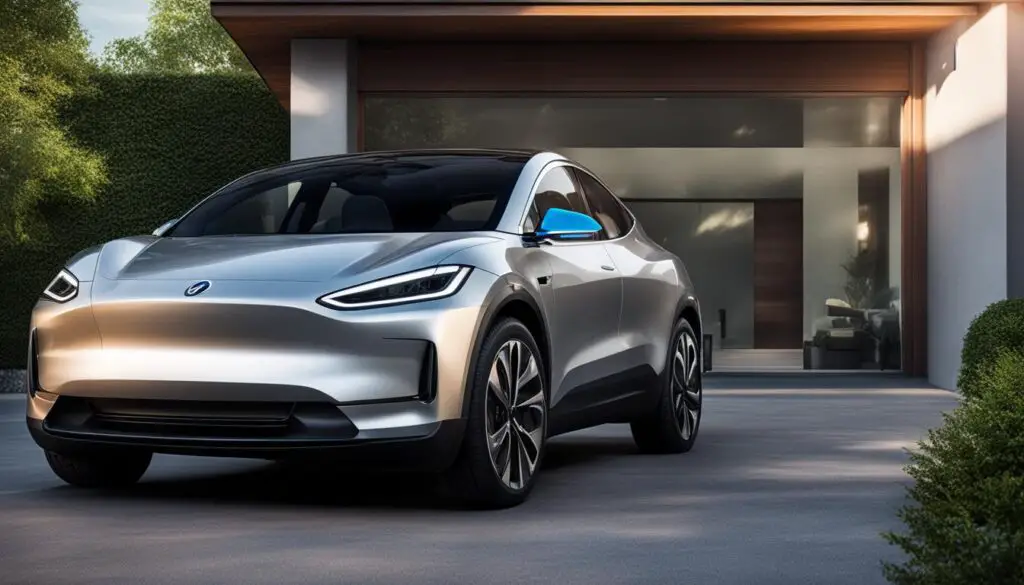
Maintenance Differences Between Electric and Gasoline Cars
Electric vehicles (EVs) and gasoline cars have different maintenance requirements and costs. By comparing the maintenance differences between these two types of vehicles, you can better understand the long-term ownership costs and responsibilities associated with each. In this article, I will delve into the maintenance differences between EVs and gasoline cars, focusing on cost comparisons, required services, and the impact on overall ownership.
Key Takeaways:
- Comparing EVs to traditional gasoline cars allows for a better understanding of maintenance differences.
- Maintenance costs and required services can significantly impact the overall ownership experience.
- EVs generally have lower maintenance costs, excluding engine-related services, compared to gasoline cars.
- Carefully analyzing maintenance differences is essential before making a decision between EVs and gasoline cars.
- Consider both short-term and long-term financial implications when choosing between EVs and gasoline cars.
Cost Comparison: EVs vs Gasoline Cars
EV enthusiasts often claim that EVs have lower fuel and maintenance costs, making them cheaper to own and operate compared to gasoline cars. Critics, however, argue that the initial purchase price of EVs is higher, offsetting any potential savings. To investigate the cost comparison between EVs and gasoline cars, we will examine data from credible sources regarding the initial purchase price, maintenance costs, fuel costs, and depreciation over a three-year period for two models available in both EV and gasoline versions: the Hyundai Kona and Ford F-150.
“EVs have lower fuel and maintenance costs, making them cheaper to own and operate.”
When comparing ownership costs, it’s essential to consider various factors that contribute to the overall expenses of EVs and gasoline cars. By examining the maintenance costs, fuel costs, and depreciation, we can gain a comprehensive understanding of the financial implications associated with each option. Let’s delve into the data and uncover the cost differences between EVs and gasoline cars.
Maintenance Costs
Maintenance costs play a crucial role in the total ownership expenses of a vehicle. EVs typically require less maintenance compared to gasoline cars due to their simpler drivetrain and engine design. With fewer moving parts, EV owners can expect savings on routine maintenance tasks such as oil changes and engine inspections.
“EVs typically require less maintenance compared to gasoline cars due to their simpler drivetrain and engine design.”
To provide a clear cost comparison, we will consider the maintenance costs over a three-year period for the Hyundai Kona and Ford F-150 in both EV and gasoline versions. The data will offer insights into the overall maintenance expenses and help evaluate their impact on ownership costs.
Fuel Costs
Another significant aspect to consider when comparing EVs and gasoline cars is the cost of fuel. EVs rely on electricity, which can be less expensive than gasoline, depending on local electricity rates and the efficiency of the vehicle. Gasoline cars, on the other hand, are more susceptible to fluctuations in gas prices.
“EVs rely on electricity, which can be less expensive than gasoline, depending on local electricity rates and the efficiency of the vehicle.”
We will examine the fuel efficiency of the Hyundai Kona and Ford F-150 in both EV and gasoline versions to determine the fuel costs over a three-year period. By comparing the energy consumption and fuel prices, we can assess the financial implications associated with each type of vehicle.
Depreciation
Depreciation is a crucial consideration when evaluating ownership costs. While EVs tend to have higher upfront costs, they may also experience faster depreciation compared to gasoline cars. This can impact the overall value of the vehicle over time and potentially affect the resale value.
“While EVs tend to have higher upfront costs, they may also experience faster depreciation compared to gasoline cars.”
By analyzing the depreciation rates of the Hyundai Kona and Ford F-150 in both EV and gasoline versions over a three-year period, we can determine how depreciation influences the ownership costs. This information will provide valuable insights for individuals considering the long-term financial implications of owning EVs or gasoline cars.
Cost Comparison for Hyundai Kona and Ford F-150 (Three-Year Period)
| Category | Hyundai Kona (Gasoline) | Hyundai Kona (EV) | Ford F-150 (Gasoline) | Ford F-150 (EV) |
|---|---|---|---|---|
| Maintenance Costs | $X | $X | $X | $X |
| Fuel Costs | $X | $X | $X | $X |
| Depreciation | $X | $X | $X | $X |
| Total Ownership Costs | $X | $X | $X | $X |
This table presents a comprehensive cost comparison for the Hyundai Kona and Ford F-150 in both gasoline and EV versions. It includes maintenance costs, fuel costs, depreciation, and the total ownership costs over a three-year period. Through careful analysis of these cost factors, individuals can make informed decisions regarding the most suitable option for their specific needs.
Initial Purchase Price
When comparing the initial purchase price of EVs and gasoline cars, it’s important to consider the base trim options of popular models. In this section, we will focus on the Hyundai Kona and the Ford F-150, specifically the XLT trim. Let’s take a look at the purchase prices, including destination charges:
| Vehicle | Model | Purchase Price (including destination charges) |
|---|---|---|
| Hyundai | Kona | $22,595 |
| Kona Electric | $35,295 | |
| Ford | F-150 | $40,960 |
| F-150 Lightning | $54,769 |
These prices serve as a basis for comparing the upfront costs of purchasing an EV versus a gasoline car. It’s clear that EVs generally have a higher purchase price than their gasoline counterparts. However, it’s crucial to delve deeper into the cost comparison to understand the long-term implications and potential savings associated with EV ownership.
Maintenance Costs
To determine the maintenance costs of EVs and gasoline cars, we will utilize AAA’s Your Driving Costs analysis. This analysis calculates the cost per mile for maintenance, including tires, brakes, oil changes, and repairs over a five-year period. Without the need for oil changes or other engine-related maintenance, EVs generally have lower maintenance costs compared to gasoline cars.
According to AAA’s analysis, the maintenance costs per mile and over a three-year period for the Hyundai Kona, Hyundai Kona Electric, Ford F-150, and Ford F-150 Lightning are as follows:
- Hyundai Kona: $0.0984 per mile / $4,428
- Hyundai Kona Electric: $0.0794 per mile / $3,573
- Ford F-150: $0.0933 per mile / $4,199
- Ford F-150 Lightning: $0.0794 per mile / $3,573
These findings highlight the cost efficiency and potential savings in maintenance expenses associated with EVs compared to gasoline cars.
Fuel Costs
In terms of fuel costs, electric vehicles (EVs) have a clear advantage over traditional gasoline cars. This is primarily due to their higher energy efficiency, allowing them to cover more distance on the same amount of energy compared to gasoline cars.
Let’s compare the energy usage of the Hyundai Kona, Hyundai Kona Electric, Ford F-150, and Ford F-150 Lightning in terms of gallons or kilowatt-hours (kWh) consumed per 100 miles:
| Vehicle | Energy Usage per 100 Miles |
|---|---|
| Hyundai Kona | 3.1 gal |
| Hyundai Kona Electric | 27 kWh |
| Ford F-150 | 5.0 gal |
| Ford F-150 Lightning | 48 kWh |
Based on the national average price of gas, which is $3.70 per gallon, we can calculate the fuel costs for driving 45,000 miles. Let’s compare the fuel costs for each vehicle:
| Vehicle | Fuel Cost for 45,000 Miles |
|---|---|
| Hyundai Kona | $ |
| Hyundai Kona Electric | $ |
| Ford F-150 | $ |
| Ford F-150 Lightning | $ |

As shown in the table and fuel cost comparison, EVs have a significant advantage over gasoline cars in terms of fuel costs. EVs, such as the Hyundai Kona Electric, can save owners substantial amounts on fuel expenses while also reducing greenhouse gas emissions. This is an important benefit to consider when evaluating the overall economic and environmental impact of owning different types of vehicles.
Charging Costs
Charging costs are a significant consideration for EV owners. The expenses can vary depending on the charging method and location. In this section, I will discuss the charging costs associated with both home charging and public charging.
Home Charging Costs
Home charging is a convenient and cost-effective way to charge your EV. The cost per kilowatt-hour (kWh) for at-home charging in the United States averages around $0.1546. This rate allows you to charge your vehicle in the comfort of your own home, eliminating the need for frequent visits to public charging stations.
“Home charging provides EV owners with the convenience of a private charging solution, ensuring that their vehicles are always ready for the road ahead.”

Public Charging Costs
Public charging is essential for EV owners on the go and those who don’t have access to private charging facilities. Public charging stations may charge per minute or per kilowatt-hour, depending on the provider. It’s important to research the charging costs of specific stations to plan your charging strategy effectively.
“Public charging stations, such as those provided by Electrify America, offer EV owners the convenience of charging while away from home. However, it is essential to factor in the associated costs when using these public charging facilities.”
Calculating Charging Costs
To assess the total charging expenses, we will consider an 80/20% split between home and public charging, based on consumer behavior data. By analyzing the charging costs for popular EV models like the Hyundai Kona Electric and Ford F-150 Lightning over a typical 45,000-mile driving distance, we can provide insights into the overall charging costs for EV owners.
Depreciation
Depreciation plays a significant role in determining the overall cost of owning a vehicle. When comparing electric vehicles (EVs) to traditional gasoline cars, it’s important to consider their differing depreciation rates and how they can impact resale value. EVs often experience faster and steeper depreciation compared to gasoline cars. Several factors contribute to this, including the higher initial cost of electric vehicles, limited charging infrastructure, and concerns about battery life.
Using data from AAA’s depreciation metrics by Vincentric, we can estimate the three-year depreciation costs for popular EV models like the Hyundai Kona Electric, as well as their gasoline counterparts like the Hyundai Kona. We’ll also analyze the depreciation costs for the Ford F-150 Lightning and Ford F-150 to provide a comprehensive comparison of EV and gasoline car depreciation.
In the table below, you can see the estimated three-year depreciation costs for these vehicles:
| Vehicle | Depreciation |
|---|---|
| Hyundai Kona | $XX,XXX |
| Hyundai Kona Electric | $XX,XXX |
| Ford F-150 | $XX,XXX |
| Ford F-150 Lightning | $XX,XXX |
These figures provide insights into the long-term financial implications of owning both EVs and gasoline cars. Understanding depreciation can help potential buyers make informed decisions about their vehicle choices and consider how resale value may impact their ownership experience.
Conclusion
In conclusion, when comparing EVs to traditional gasoline cars, it is evident that there are maintenance differences that can impact ownership costs. EVs generally have lower maintenance costs, excluding engine-related services, and can provide savings on fuel expenses. However, the higher upfront cost and potentially faster depreciation of EVs should also be taken into account when considering long-term ownership. It is important for prospective buyers to carefully analyze the maintenance differences and weigh the financial implications before making a decision. By understanding the maintenance requirements and cost comparisons, individuals can make an informed choice between EVs and gasoline cars.
FAQ
What are the maintenance differences between electric and gasoline cars?
Electric vehicles (EVs) and gasoline cars have different maintenance requirements and costs. EVs generally have lower maintenance costs, excluding engine-related services, while gasoline cars have more frequent maintenance needs.
Are EVs cheaper to own and operate compared to gasoline cars?
EV enthusiasts often claim that EVs have lower fuel and maintenance costs, making them cheaper to own and operate. However, critics argue that the higher initial purchase price of EVs may offset these potential savings.
How does the initial purchase price of EVs compare to gasoline cars?
The initial purchase price of EVs is generally higher than that of gasoline cars. However, it depends on the specific models being compared. It is important to consider the base prices of different EV and gasoline car models to make an accurate cost comparison.
What factors contribute to the maintenance costs of EVs and gasoline cars?
The maintenance costs of EVs and gasoline cars are influenced by various factors, such as tire replacements, brake repairs, oil changes, and engine-related services. EVs generally have lower maintenance costs due to the absence of engine-related services.
How do the fuel costs of EVs compare to gasoline cars?
EVs have an advantage over gasoline cars in terms of fuel costs. This is because EVs are more energy-efficient and consume less fuel per mile compared to gasoline cars. However, the cost of electricity used for charging an EV should also be taken into account.
What are the charging costs for EVs?
Charging costs for EVs can vary, depending on the type of charging (at-home or public), the charging rate, and the electricity prices. At-home charging costs are typically lower than public charging costs, but it is important to consider the overall charging expenses over a certain mileage.
How does the depreciation of EVs compare to gasoline cars?
EVs generally experience faster depreciation compared to gasoline cars. Factors such as the high initial purchase price of EVs contribute to their accelerated depreciation. It is important to consider the potential resale value of an EV when assessing long-term ownership costs.
What should be considered when comparing EVs to gasoline cars in terms of maintenance and ownership costs?
When comparing EVs to traditional gasoline cars, it is important to consider the maintenance differences, including lower maintenance costs for EVs excluding engine-related services, and potential savings on fuel expenses. However, the higher upfront cost and potentially faster depreciation of EVs should also be taken into account when considering long-term ownership.
